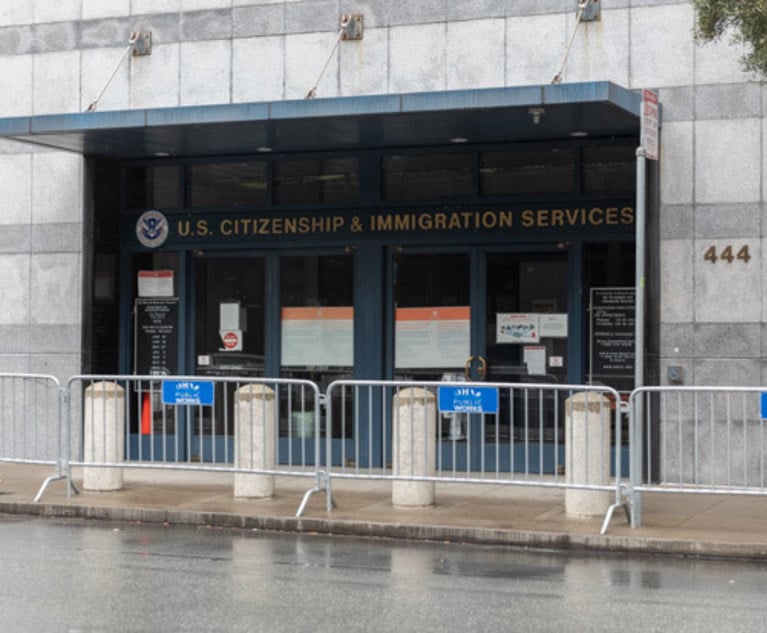DACA Is Unlawful. Is It Dead?
In DACA's decadelong history, neither the program nor the people protected by it have ever been secure.
July 19, 2021 at 06:48 PM
3 minute read
 (Photo: Diego M. Radzinschi/ALM)
(Photo: Diego M. Radzinschi/ALM)
On Friday, a federal court in Texas ruled that the federal government can no longer accept new undocumented immigrants into DACA. The program, which stands for Deferred Action for Childhood Arrivals, has served as a legal shield for 600,000 people who entered the United States illegally as children.
In DACA's decadelong history, neither the program nor the people protected by it have ever been secure. And it's not like this is a program that has been lacking support on both sides of the political aisle. A Pew Research Center study in 2020 showed that (perhaps surprisingly to some) 54% of Republicans support DACA while (unsurprisingly) 90% of Democrats do.
Adriana Gonzalez, a South Florida attorney who has helped many DACA-protected individuals over the years, sees this as yet another obstacle to a secure life for them the United States.
"The fact that we are in 2021 and DACA has again today been given what might be a knockout punch is beyond belief," she said. "It is unconscionable that the federal district court has adopted a position that puts so many people in immediate danger."
The verbiage of today's federal ruling in Texas is particularly unsettling for DACA's many proponents. While the Texas court did not order the federal government to invalidate the current protections for the 616,000 people in the program, it directly attacked the Obama administration for illegally establishing the program, arguing that it had no legal right to do so.
And it's not like things were good for DACA recipients literally yesterday when CNN ran a piece on the travails of a DACA recipient being strangled by government red tape. Between endless permits, cycles of misinformation, and constant waiting, the old and new obstacles faced by DACA recipients are a deep program fissure.
DACA has also always suffered from one fundamental design problem, which may be its ultimate demise: It is an executive action. This means that it can fall prey to the whim of post-Obama presidents, as it did under the Trump administration, which tried its utmost to end it.
What would ultimately save DACA and protect the people it was created to help has been far too late in coming. With both parties unable to pass legislation to make DACA permanent and give it resilience that no executive action can have, its vulnerability mirrors that of the people enrolled in the program: it is, as we saw today, now in the hands of the courts to shape its future.
This isn't a viable solution for anyone, including Gonzalez, who adds a fitting final note:
"It's time for immigration reform," she said. "The courts simply can't be trusted with this."

Aron Solomon, J.D., is the head of strategy for Esquire Digital and the editor of Today's Esquire. He has taught entrepreneurship at McGill University and the University of Pennsylvania, and was the founder of LegalX, the world's first legal technology accelerator. Solomon's work has been featured in TechCrunch, Fortune, Venture Beat, The Independent, TechCrunch Japan, Yahoo, ABA Journal, Law.com, The Boston Globe, The Hill, and many other leading publications around the world.
This content has been archived. It is available through our partners, LexisNexis® and Bloomberg Law.
To view this content, please continue to their sites.
Not a Lexis Subscriber?
Subscribe Now
Not a Bloomberg Law Subscriber?
Subscribe Now
NOT FOR REPRINT
© 2025 ALM Global, LLC, All Rights Reserved. Request academic re-use from www.copyright.com. All other uses, submit a request to [email protected]. For more information visit Asset & Logo Licensing.
You Might Like
View All
Lawyers' Phones Are Ringing: What Should Employers Do If ICE Raids Their Business?
6 minute read
Business Immigration Practices Brace for ‘Dramatic’ Changes Under Second Trump Presidency

'Close Our Borders?' Senate Judiciary Committee Examines Economics, Legal Predicate for Mass Deportation Proposal
3 minute read
Anticipating a New Era of 'Extreme Vetting,' Big Law Immigration Attys Prep for Demand Surge
6 minute readTrending Stories
Who Got The Work
J. Brugh Lower of Gibbons has entered an appearance for industrial equipment supplier Devco Corporation in a pending trademark infringement lawsuit. The suit, accusing the defendant of selling knock-off Graco products, was filed Dec. 18 in New Jersey District Court by Rivkin Radler on behalf of Graco Inc. and Graco Minnesota. The case, assigned to U.S. District Judge Zahid N. Quraishi, is 3:24-cv-11294, Graco Inc. et al v. Devco Corporation.
Who Got The Work
Rebecca Maller-Stein and Kent A. Yalowitz of Arnold & Porter Kaye Scholer have entered their appearances for Hanaco Venture Capital and its executives, Lior Prosor and David Frankel, in a pending securities lawsuit. The action, filed on Dec. 24 in New York Southern District Court by Zell, Aron & Co. on behalf of Goldeneye Advisors, accuses the defendants of negligently and fraudulently managing the plaintiff's $1 million investment. The case, assigned to U.S. District Judge Vernon S. Broderick, is 1:24-cv-09918, Goldeneye Advisors, LLC v. Hanaco Venture Capital, Ltd. et al.
Who Got The Work
Attorneys from A&O Shearman has stepped in as defense counsel for Toronto-Dominion Bank and other defendants in a pending securities class action. The suit, filed Dec. 11 in New York Southern District Court by Bleichmar Fonti & Auld, accuses the defendants of concealing the bank's 'pervasive' deficiencies in regards to its compliance with the Bank Secrecy Act and the quality of its anti-money laundering controls. The case, assigned to U.S. District Judge Arun Subramanian, is 1:24-cv-09445, Gonzalez v. The Toronto-Dominion Bank et al.
Who Got The Work
Crown Castle International, a Pennsylvania company providing shared communications infrastructure, has turned to Luke D. Wolf of Gordon Rees Scully Mansukhani to fend off a pending breach-of-contract lawsuit. The court action, filed Nov. 25 in Michigan Eastern District Court by Hooper Hathaway PC on behalf of The Town Residences LLC, accuses Crown Castle of failing to transfer approximately $30,000 in utility payments from T-Mobile in breach of a roof-top lease and assignment agreement. The case, assigned to U.S. District Judge Susan K. Declercq, is 2:24-cv-13131, The Town Residences LLC v. T-Mobile US, Inc. et al.
Who Got The Work
Wilfred P. Coronato and Daniel M. Schwartz of McCarter & English have stepped in as defense counsel to Electrolux Home Products Inc. in a pending product liability lawsuit. The court action, filed Nov. 26 in New York Eastern District Court by Poulos Lopiccolo PC and Nagel Rice LLP on behalf of David Stern, alleges that the defendant's refrigerators’ drawers and shelving repeatedly break and fall apart within months after purchase. The case, assigned to U.S. District Judge Joan M. Azrack, is 2:24-cv-08204, Stern v. Electrolux Home Products, Inc.
Featured Firms
Law Offices of Gary Martin Hays & Associates, P.C.
(470) 294-1674
Law Offices of Mark E. Salomone
(857) 444-6468
Smith & Hassler
(713) 739-1250






